Professions and functions in the civil service
Civil servants undertake a wide variety of activities, but what are the different types of professions?
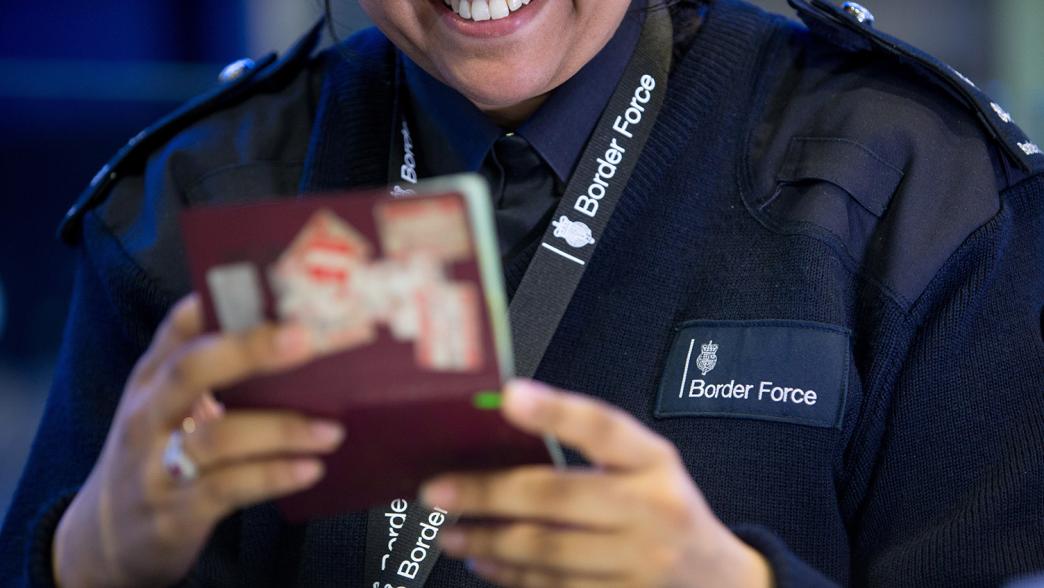
What are professions and functions in the civil service?
Civil servants undertake a wide variety of activities, including analysing policy options, managing government contracts, and providing frontline support to people using public services. For these activities to be done well, they need to be done by people with the appropriate training and expertise, and for government to operate effectively, it therefore needs a workforce with a range of different skillsets.
The civil service recognises this and categorises its workforce into 28 ‘professions’. These are groupings of officials with similar expertise, such as veterinarians. Professions focus on developing the capabilities of staff with particular skills, and providing them with career development opportunities. All civil servants are members of a profession, although due to poor data collection the professions of many civil servants are unknown.
Reforms since 2013 have also helped to develop a series of centrally managed, cross-government ‘functions’ to improve the way the civil service conducts activities that rely on specialist skills. These functions overlap with the civil service’s existing professions, but there are some differences between the two. Unlike professions, which focus on people, functions focus on activities that occur across departments, such as finance, commercial or project delivery. They define what needs to be done and why, so that the activities they oversee can be conducted effectively. To achieve this, they provide expert advice, and are responsible for setting cross-government strategies and standards to ensure that activities are delivered widely and consistently across the civil service. Around a quarter of civil servants belong to a function.
What are the different types of professions in the civil service?
Professions in the civil service can be divided into three overarching categories:
- Operational delivery covers civil servants engaged in delivering services to the public. This is a very broad category that can include case handlers at the Department for Work and Pensions (DWP), Border Force officers at the Home Office (HO) and prison officers at the Ministry of Justice (MoJ). In March 2021, over a third of civil servants worked in operational delivery.
- Cross-departmental specialisms cover roles that are needed across all Whitehall departments. Some of these are specialisms that are needed in any large organisation, such as finance or human resources. Others, such as policy, are more specific to government. In March 2021, these roles made up nearly a quarter of the civil service.
- Departmental specialisms offer expertise in areas that are relevant to specific departments or agencies. These include tax specialists at HMRC or education inspectors at the Office for Standards in Education, Children's Services and Skills (Ofsted). In March 2021, these roles made up about an eighth of the civil service
The professions of nearly 30% of civil servants are unknown – either because they have not been reported or because they have been reported vaguely as ‘other’.

What is the operational delivery profession?
162,000 civil servants worked in operational delivery in 2021. Additionally, the Department for Work and Pensions has not reported data on professions since 2017, at which time it employed 65,000 operational delivery specialists. Assuming numbers at DWP have remained the roughly the same since 2017, operational delivery likely makes up around half the civil service.
Most of these jobs are in a handful of very large departments including HM Revenue and Customs (HMRC), the Home Office and the Ministry of Justice. They cover roles such as operational support officers at Jobcentre Plus or prison officers at HM Prisons and Probation Service.
Agencies of the Department for Business, Energy and Industrial Strategy (BEIS), the Department for Transport (DfT), the Department of Health and Social Care (DHSC) and the Department for Environment, Food and Rural Affairs (Defra) also employ relatively large numbers of staff for operational delivery. These include technical caseworkers at HM Land Registry, driving and vehicle inspectors at the Driver and Vehicle Standards Agency and public health workers at Public Health England.
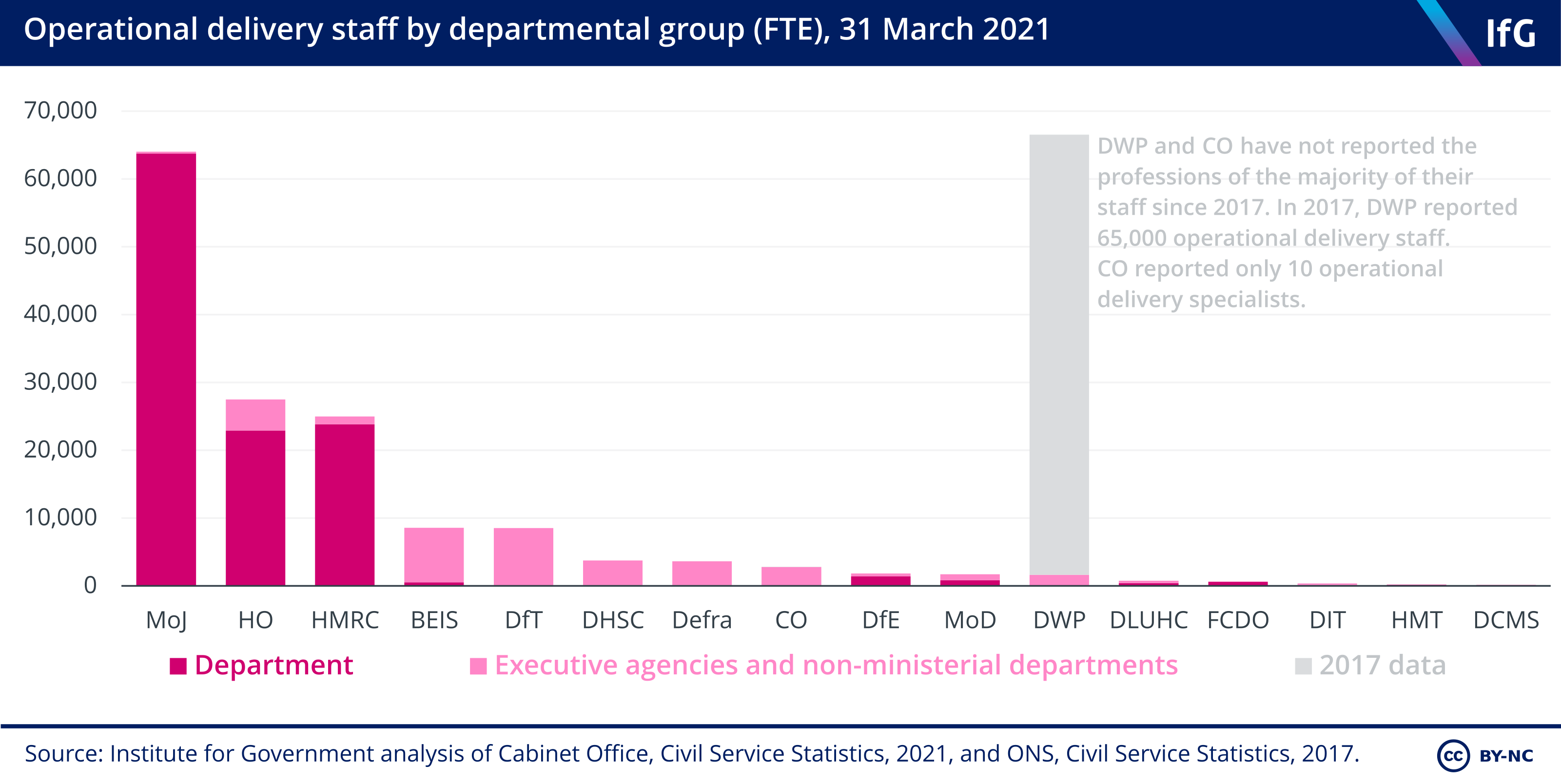
What are departmental professions?
Departmental specialists offer skills and expertise to support specific requirements of departments or agencies. They tend to be concentrated in certain organisations.
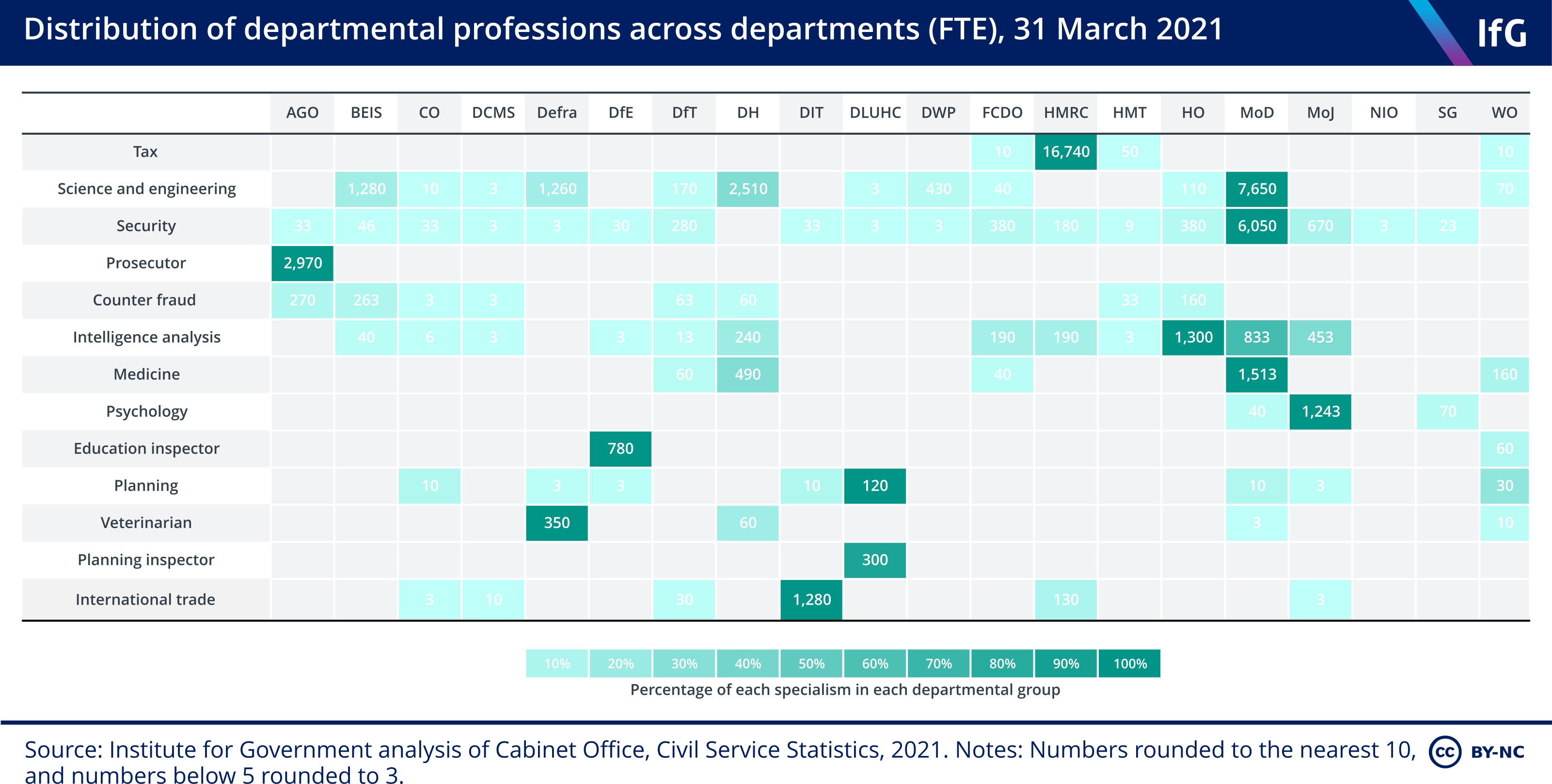
The Ministry of Defence (MoD) is home to many of these specialists, including most of the science and engineering, security and medicine specialists.
Virtually all 16,800 of the government’s tax specialists work for HMRC, while psychologists mainly work in the prison service within MoJ.
Specialist agencies such as Ofsted (an agency of the Department for Education), the Animal and Plant Health Agency (an agency of the Department for Environment, Food & Rural Affairs) and the Planning Inspectorate (an agency of the Ministry of Communities and Local Government) respectively employ most education inspectors, veterinarians and planning inspectors.
What are cross-departmental professions and how do they differ from functions?
Cross-departmental professions include roles that are needed across all Whitehall departments. Some are roles that are a basic requirement for any large organisation such as finance, legal or human resources. Others are more specific to government, such as policy or analytics.
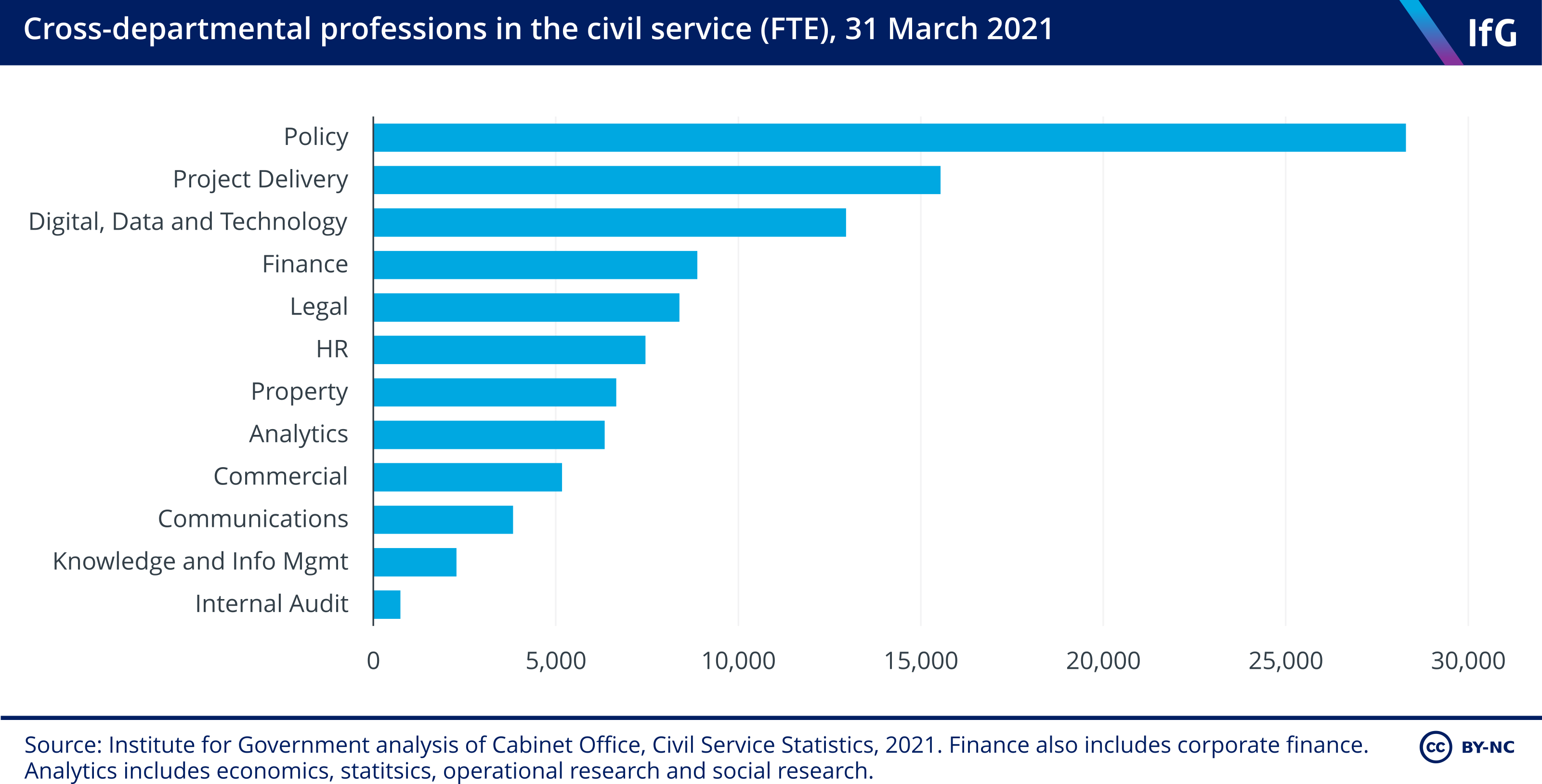
More than 28,000 civil servants work on policy – the largest cross-departmental profession. The next three largest are project delivery, digital, data and technology, and finance.
The cross-departmental nature of these professions makes them suited to centrally driven efforts to standardise best practice. The majority of these cross-departmental professions align to the 14 centrally managed, cross-government ‘functions’ – including project delivery, digital, data and technology, finance, legal, HR, property, commercial, communications, and internal audit.
However, these professions and functions do not align exactly. For instance, there are 12,000 more civil servants in the project delivery function than in the project delivery profession. And notably, policy is not a function in the civil service.
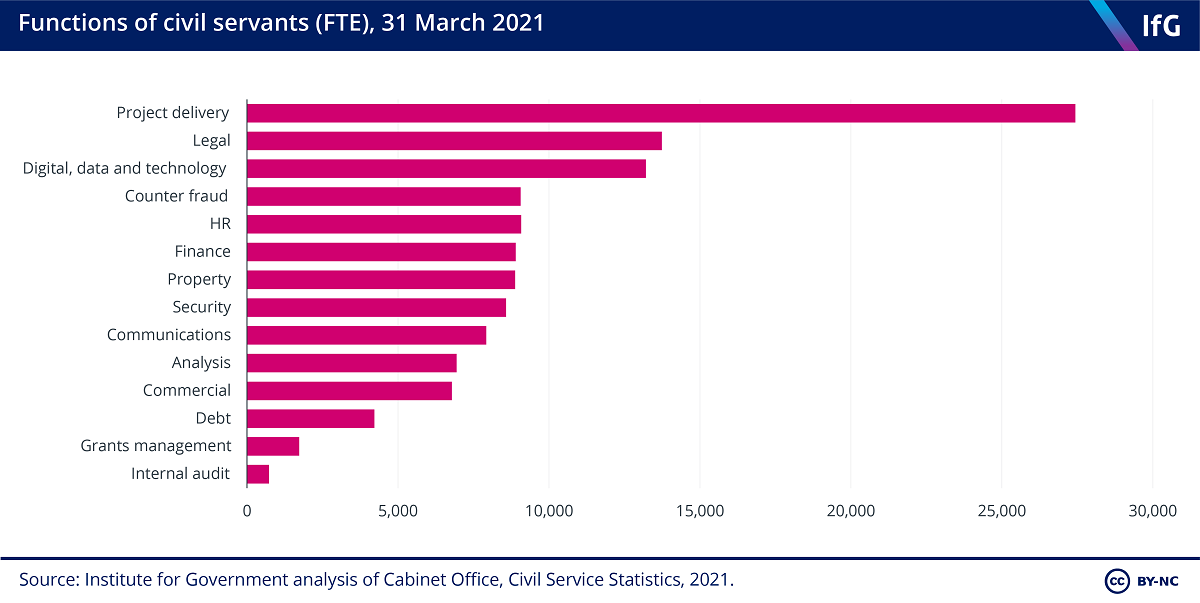
How have the size of professions in the civil service changed over time?
In recent years it is the policy profession has grown most notably in absolute numbers, as policy specialists were hired to deal with the heavy workload created by Brexit and the pandemic. Between March 2020 and March 2021, the policy profession grew by 4,120 staff, an increase of 17%. DHSC alone had 1,000 more policy specialists than it did at the start of the pandemic, while BEIS, involved in the vaccine rollout, increased its number by 810.
The digital, data and technology profession, which saw the next largest increase, grew by a more modest 2,190 staff. Other professions relating to skills which the government is keen to develop in the longer term, including project delivery and science and engineering, also grew between March 2020 and March 2021, by 2,170 and 1,500 civil servants respectively.
Only three professions decreased in size between March 2020 to March 2021: knowledge and information management, internal audit, and planning.
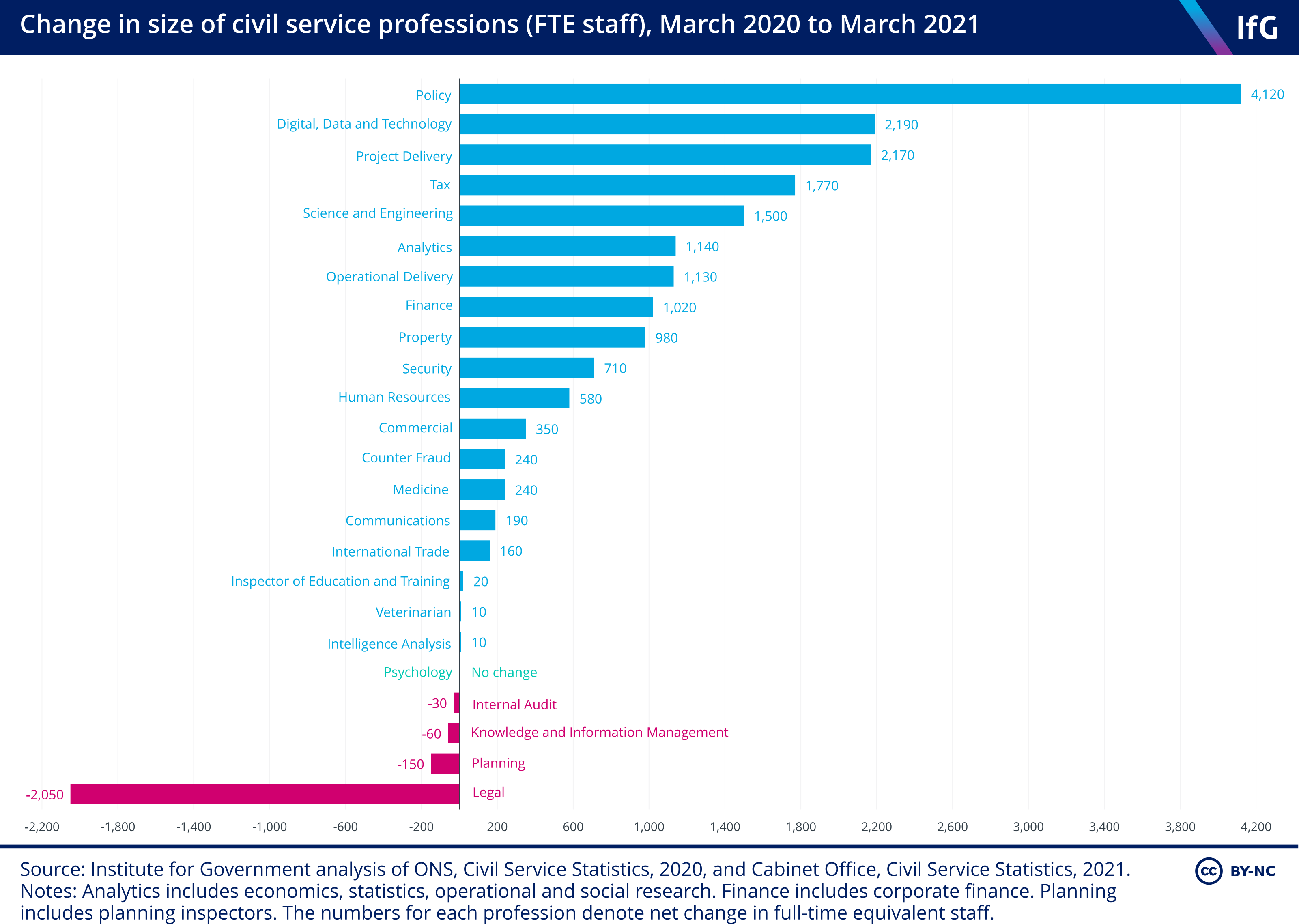
This expansion of the policy profession is part of a longer-term trend. Between 2010 and 2016, the number of policy specialists in the civil service remained relatively stable. But since March 2016, just before the EU referendum, the policy profession has grown by 11,720 staff – an increase of 71%. This is more than twice the next largest growth in staff, in the project delivery profession, which increased by 5,030 civil servants.
The departments most affected by Brexit have most radically increased their numbers of policy specialists. BEIS now employs three times the number of policy professionals that it did in 2016, while numbers at Defra and the Home Office have more than doubled.**
Between March 2016 and March 2021, the operational delivery profession decreased most in absolute numbers, by 51,440 staff or 24%. But this is skewed by DWP, a large operational department, failing to report the professions of its staff since 2017.
Planning, a much smaller profession, shrunk by 1,940 staff. Relative to its modest initial size, this represents a decrease of more than 75%.
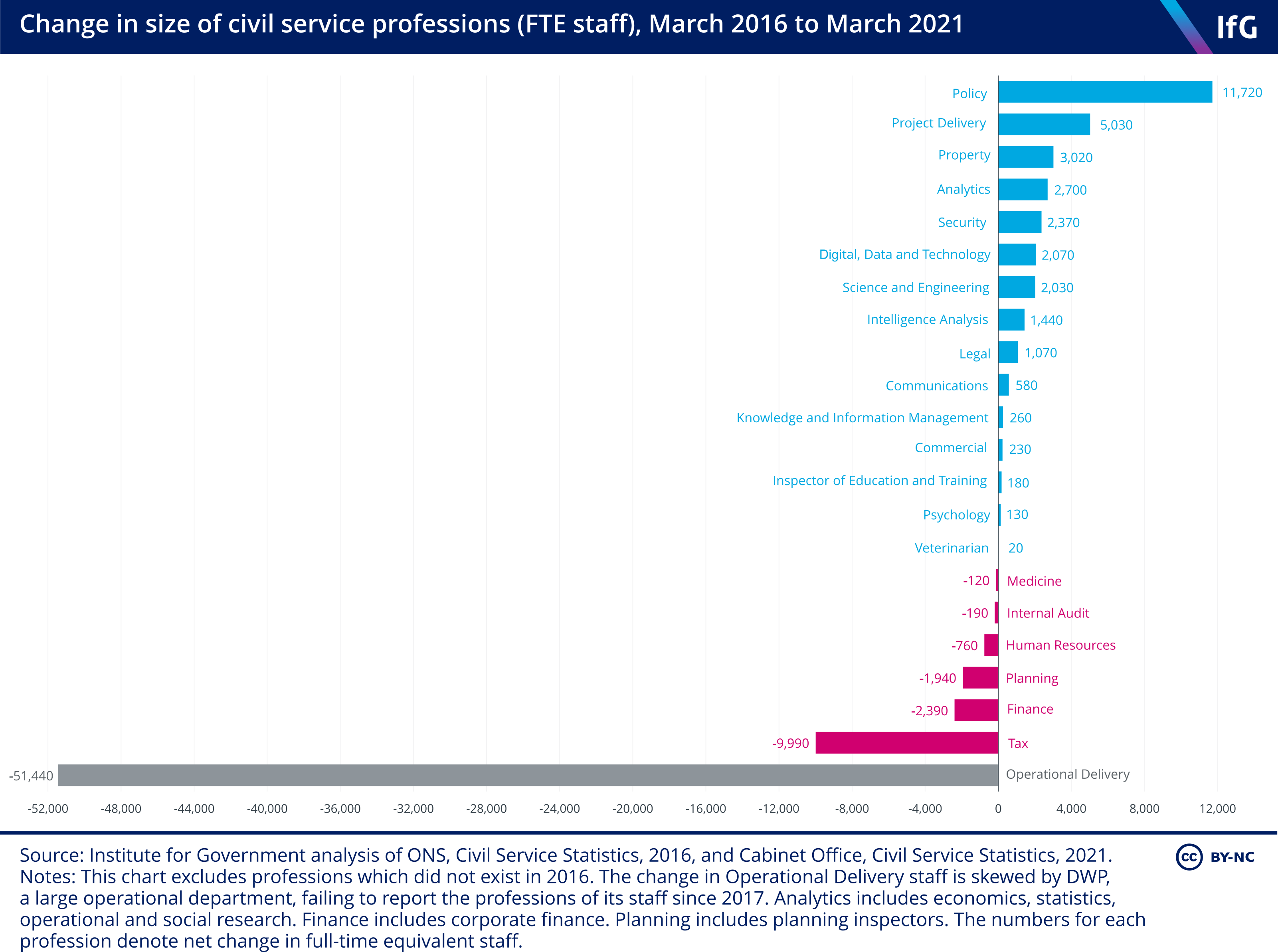
What is unknown about professions in the civil service?
The professions of 29% of civil servants is unknown. This is either because their professions have not been reported or because they have been reported vaguely as ‘other’. This is the same proportion as in 2020, but represents a significant increase on 2017, when only about 10% of officials had an unknown profession.
This is mainly because since 2017, DWP – a particularly large department – has failed to report any data on professions, and the Cabinet Office has reported it for only a small fraction of their workforce. In 2021, the Cabinet Office reported the professions of just 110 of their 9,280 staff.
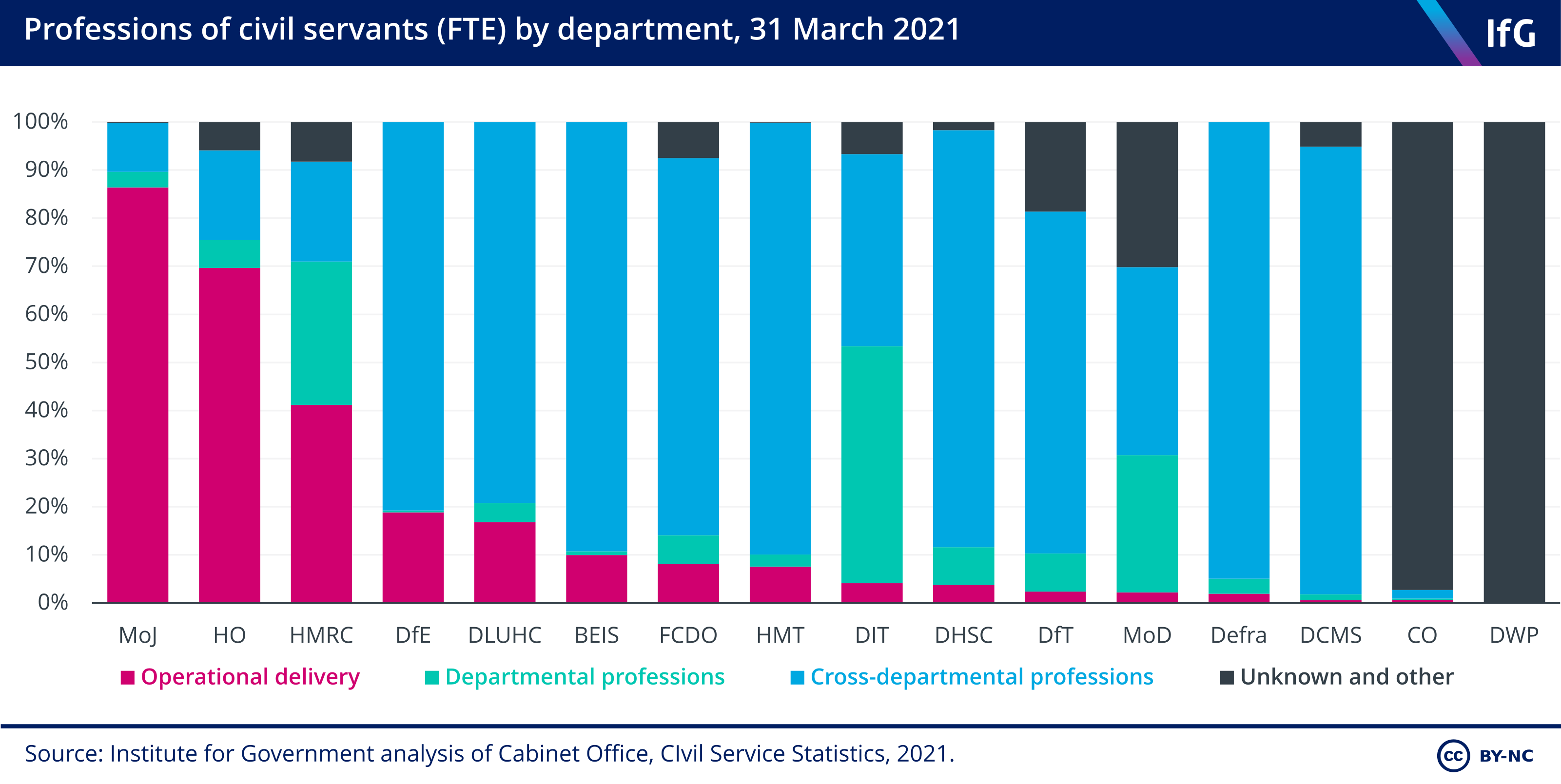
In March 2017, a report by the National Audit Office found that not having 'a clear picture of its current skills' hinders the government's attempts to plan its workforce effectively. And in November 2020, the government’s chief people officer told the Public Accounts Committee that the civil service remained a number of years away from knowing what skills individual civil servants have.
* This list of functions is based on the government’s 2021 functional standards, which have been updated more recently than the Cabinet Office’s Civil Service Statistics 2021, from which the figures for the chart above were extracted. No functional standard was published for the legal function in 2021, so it is not listed here. Additionally, the more recent list of functional standards differs from the Civil Service Statistics dataset in changing the names of ‘Communications’ to ‘Communication’, ‘Corporate Finance’ to ‘Finance’, and ‘Grants Management’ to ‘Grants’.
** BEIS was created in 2016 through a merger of the Department of Energy and Climate Change (DECC) and the Department for Business, Innovation and Skills (BIS). The number of policy professionals employed by BEIS in 2016 is calculated as the sum of those employed by DECC and BIS in March 2016.
- Topic
- Civil service
- Keywords
- Civil servants Civil service reform
- Department
- Cabinet Office
- Publisher
- Institute for Government